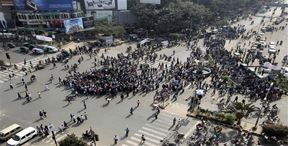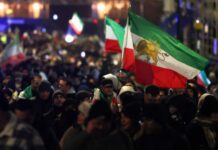 DHAKA: Bangladesh’s Supreme Court today upheld the death sentence for top Jamaat-e-Islami leader Abdul Quader Mollah, infamous as the “Butcher of Mirpur”, for 1971 war crimes, rejecting a review plea two days after his hanging was dramatically put on hold in a last-minute reprieve.
DHAKA: Bangladesh’s Supreme Court today upheld the death sentence for top Jamaat-e-Islami leader Abdul Quader Mollah, infamous as the “Butcher of Mirpur”, for 1971 war crimes, rejecting a review plea two days after his hanging was dramatically put on hold in a last-minute reprieve.
“(The review petition is) not maintainable… (it’s) rejected,” Chief Justice Muzammel Hossain ruled at a packed courtroom amid tight security after two days of hearing on the maintainability of the review prayers.
The verdict removes the last barrier for the execution of 65-year-old Mollah, who has been lodged at the high security Dhaka Central Jail. There was no immediate word on when the death sentence will be carried out.
For his atrocities and for siding with Pakistani troops during the 1971 Liberation War, Mollah was dubbed as the “Butcher of Mirpur” where led the infamous Al-Badr militia which slaughtered a large number of people including children.
Mollah, the assistant secretary-general of the Jamaat-e- Islami and the fourth-highest Jamaat leader, was the first politician to be found guilty by the Supreme Court after it rejected an appeal to acquit him of all charges.
Court officials said all the judges of the five-member bench of the Appellate Division today unanimously delivered the decision as the defense lawyers exhausted their last legal effort to save Mollah.
Previously the same bench sentenced him to death when one of the five judges preferred life imprisonment instead of the capital punishment.
Attorney General Mahbubey Alam earlier opposed the defense plea, saying the constitution did not grant the scope for convicts of crimes against humanity to get reviewed the verdicts against them by the apex court.
“Despite our arguments about lack of scopes of hearing their review petition, the highest court heard them for two days and came up with the decision… now there is no legal bar against executing the verdict,” Alam said.
Chief defense lawyer Abdur Razzak said the apex court has an inherent capacity or authority to review such judgments. He said Mollah could still get seven days of time to seek the presidential clemency.
Asked for comments about Razzak’s remarks on the clemency, Alam said he was earlier asked if he wanted to be pardoned when “he gave no reply”.
Tight vigil was enforced in and around the court complex where lawyers were allowed entrance only after security checks as suspected Jamaat activists attacked the village home of the second Supreme Court judge in as many days. . Mollah’s execution was stayed less than two hours before he was set to be hanged on Tuesday. The stay order came as jail officials prepared to hang him at one minute past midnight.
A special tribunal issued the death warrant for Mollah earlier this week after the Supreme Court released the full version of its verdict confirming his capital punishment for committing crimes against humanity during 1971 Liberation War.
The apex court headed by the chief justice earlier handed down death penalty to Mollah revising the International Crimes Tribunal verdict which previously had sentenced him to life imprisonment.
Mollah was arrested on July 13, 2010, while the tribunal indicted him on May 28, 2012, on six specific charges for actively participating, facilitating, aiding and substantially contributing to the attacks on unarmed civilians, “causing commission of the horrific genocides, murders and rapes”.
Meanwhile, violence gripped parts of Bangladesh overnight leaving at least one person dead in shootouts between Jamaat activists and police in southeastern Laxmipur where 12 people received bullet wounds, according to TV channels.
In a pre-dawn attack, suspected Jamaat activists tried to torch the village home of chairman of International Crime Tribunal Justice Fazle Kabir hurling four petrol bombs, a day after they attacked the village home of apex court judge SK Sinha at northeaster Sunamganj setting it on fire.
One of the prosecution witnesses who testified against another convicted Jamaat leader succumbed to his wounds yesterday.
State Minister for Home Shamsul Haque today issued a stern warning against “attempts to create anarchy”, saying paramilitary BGB and other law enforcement agencies were asked to dealt with severely the troublemakers.
Meanwhile, hundreds of youngsters and war veterans celebrated the verdict chanting 1971 time slogans at the capital’s Shahbagh Square, calling the apex court decision as “victory of the Liberation War”.
Two war crimes tribunals are trying the high profile accused of “crimes against humanity” during the 1971 war, mostly belonging to Jamaat, which was opposed to the country’s 1971 independence.
The two special tribunals so far have delivered verdicts in nine cases handing down capital punishment to six but no death sentence has been executed so far.–PTI






